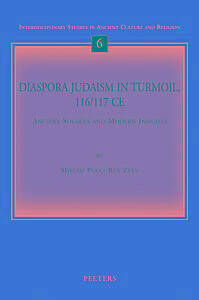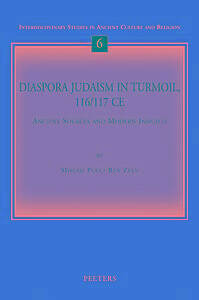
- Retrait gratuit dans votre magasin Club
- 7.000.000 titres dans notre catalogue
- Payer en toute sécurité
- Toujours un magasin près de chez vous
- Retrait gratuit dans votre magasin Club
- 7.000.000 titres dans notre catalogue
- Payer en toute sécurité
- Toujours un magasin près de chez vous
Diaspora Judaism in Turmoil, 116/117 CE: Ancient Sources and Modern In
Ancient Sources and Modern Insights
Ben Ze'ev M.
40,00 €
+ 80 points
Description
Between the two wars fought in Judaea against the Roman government - the 'Great War' and that of Bar Kochba - the uprisings of Diaspora Jews toward the end of Trajan's reign constitute a unique event in the history of the Second Jewish Commonwealth. It marks the first and only episode of Jewish violence on a grand scale to take place outside Judaea, and at the same time the only instance of simultaneous outbursts in different geographical places - Libya, Egypt, Cyprus and Mesopotamia, and apparently Judaea as well. What happened exactly? Where did the Jews get their arms from and for how long did they succeed in resisting the impact of the Roman legions? Generations of scholars accepted the statement of Eusebius that the uprisings started in 115 CE, but the possibility has been recently put forward that the revolt broke out, instead, only in 116. Moreover, what was the order in which the upheavals took place: the traditional one - Libya, Egypt, Cyprus and Mesopotamia - as most scholars believe following the testimony of Eusebius, or, rather, is the correct order the opposite? If, in fact, the Jews of Mesopotamia were the first to take up arms, the events that took place in the East would have been determinant in fomenting the uprisings in the western Mediterranean region. An assessment of the new theories is a must and involves a reconsideration both of the literary accounts and their own sources and of other kinds of information available, including the ostraca found in Egypt and a number of papyri either recently discovered or only now ascribed to the events of these upheavals. The first part of this work presents here, for the first time, a full collection of the epigraphical, papyrological, and historical sources of pagan, Christian and Jewish origin dealing with these events, in their original language and in English translation. In the second part, a fresh reading, both of the sources and of scholarly views, leads Miriam Pucci Ben Zeev to new interpretations of events in Egypt, Mesopotamia and Judaea and to a new chronology, which enables her to reach surprising conclusions concerning a possible interrelationship between the upheavals in the different countries.
Spécifications
Parties prenantes
- Auteur(s) :
- Editeur:
Contenu
- Nombre de pages :
- 302
- Langue:
- Néerlandais
- Collection :
- Tome:
- n° 6
Caractéristiques
- EAN:
- 9789042916050
- Date de parution :
- 30-09-05
- Format:
- Livre relié
- Format numérique:
- Trade paperback (VS)
- Dimensions :
- 162 mm x 239 mm
- Poids :
- 517 g







